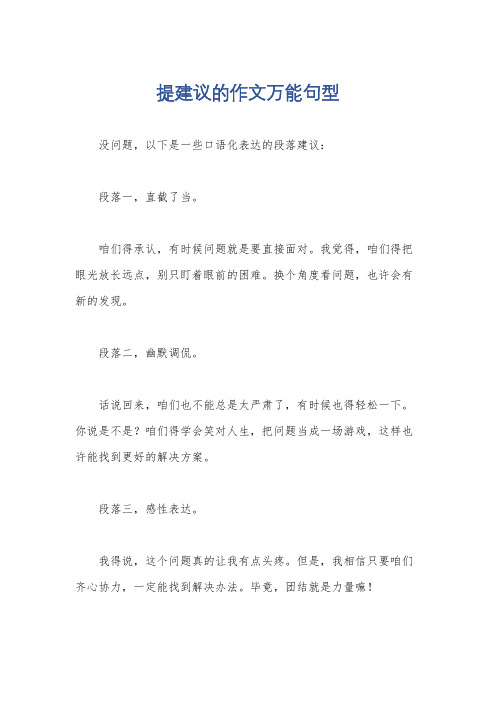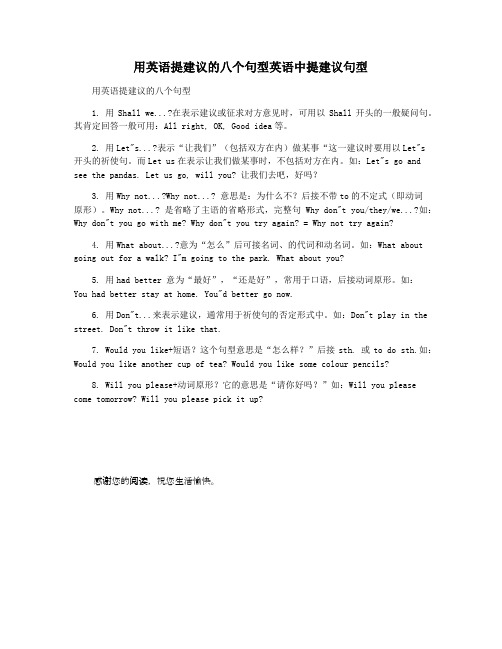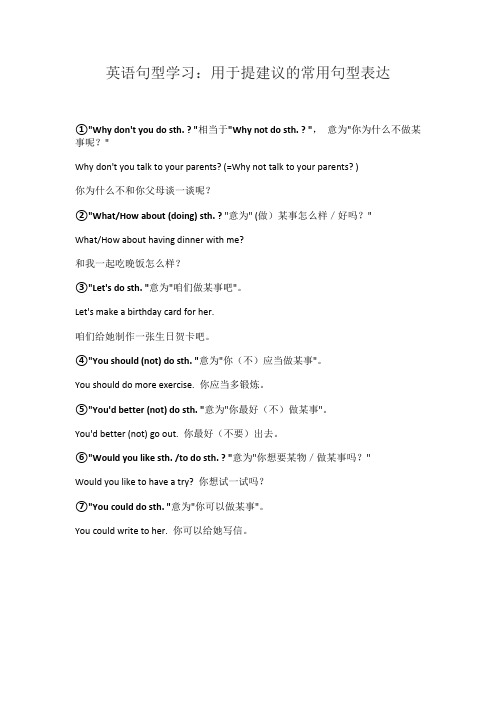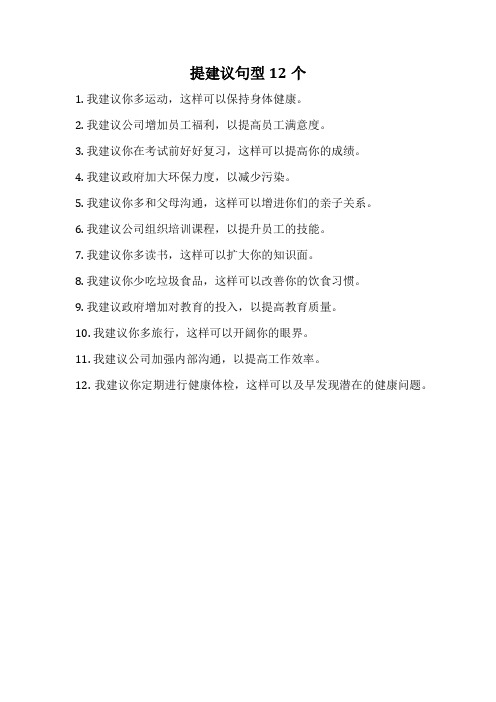表示提建议的句型
表示提建议的英语句型

表示提建议的英语句型提建议是在日常交流和工作中经常会用到的一种语言表达方式。
“表示提建议的英语句型”是一个帮助英语学习者在表达提建议时能够更加准确、流利和自信的文章。
下面我将通过介绍常用的句型和实践应用,帮助你更好地理解和掌握这一语言技巧。
1. 提出观点When it comes to...,I suggest/recommend...例如:When it comes to increasing productivity, I suggest utilizing time management techniques.2. 建议某人做某事I suggest/recommend (that) + 主语 + (should) + 动词原形...例如:I suggest that you should attend the seminar.3. 建议采取某种行动It would be advisable to + 动词原形...例如:It would be advisable to consult a financial advisor before making any investment decisions.4. 提出个人意见In my opinion, I suggest/recommend...例如:In my opinion, I recommend hiring additional staff to improve customer service.5. 强调建议的重要性It is important (for someone) to + 动词原形...例如:It is important for children to develop a reading habit from an early age.6. 开头的引言As the saying goes, "..."例如:As the saying goes, "A stitch in time saves nine." I suggest fixing small problems promptly.7. 建议的条件If + 条件从句,(then) + 结果从句...例如:If you want to improve your speaking skills, then I suggest joining a language exchange program.8. 建议与后果If I were you, I would... because...例如:If I were you, I would take a break because overworking may lead to burnout.9. 客气地建议I would appreciate it if + 主语 + 动词原形...例如:I would appreciate it if you could provide more details about the project.10. 结尾总结In conclusion, I suggest/recommend...例如:In conclusion, I recommend incorporating regular exercise into your daily routine for better health.以上是表示提建议的常用英语句型。
用英语提建议的八个句型

7.Wouldyoulike+短语?这个句型意思是“……怎么样?”后接sth.或todosth.如:Wouldyoulikeanothercupoftea?Wouldyoulikesomecolourpencils?
用英语提建议的八个句型
1.用Shallwe...?在表示建议或征求对方意见时,可用以Shall开头的一般疑问句。其肯定回答一般可用:Allright,OK,Goodidea等。
2.用Let's...?表示“让我们”(包括双方在内)做某事“这一建议时要用以Let's开头的祈使句。而Letus在表示让我们做某事时,不包括对方在内。如:Let'sgoandseethepandas.Letusgo,willyou?让我们去吧,好吗?
4.用Whatabout...?意为“……怎么”后可接名词、的代词和动名词。如:Whataboutgoingoutforawalk?I'mgoingtothepark.Whataboutyou?
5.用hadbetter意为“最好”,“还是……好”,常用于口语,后接动词原形。如:Youhadbetterstayathome.You'dbettergonow.
8.Willyouplease+动词原形……?它的意思是“请你……好吗?”如:Wiupleasepickitup?
3.用Whynot...?Whynot...?意思是:为什么不……?后接不带to的不定式(即动词原形)。Whynot...?是省略了主语的省略形式,完整句Whydon'tyou/they/we...?如:Whydon'tyougowithme?Whydon'tyoutryagain?=Whynottryagain?
提建议的作文万能句型

提建议的作文万能句型
没问题,以下是一些口语化表达的段落建议:
段落一,直截了当。
咱们得承认,有时候问题就是要直接面对。
我觉得,咱们得把眼光放长远点,别只盯着眼前的困难。
换个角度看问题,也许会有新的发现。
段落二,幽默调侃。
话说回来,咱们也不能总是太严肃了,有时候也得轻松一下。
你说是不是?咱们得学会笑对人生,把问题当成一场游戏,这样也许能找到更好的解决方案。
段落三,感性表达。
我得说,这个问题真的让我有点头疼。
但是,我相信只要咱们齐心协力,一定能找到解决办法。
毕竟,团结就是力量嘛!
段落四,启发式提问。
你有没有想过,为什么这个问题会这么难解决?是不是咱们的思路出了问题?我觉得,咱们得换个思路,从另一个角度去看待这个问题。
段落五,鼓励激励。
别灰心,我知道这个问题很难,但是咱们不能放弃。
我相信,只要咱们坚持下去,一定能找到解决办法。
毕竟,成功就在眼前,咱们得加油!。
英语中提建议句型

句型⼀: Would you like / love (to do) sth.? 这是⼀个很委婉的表⽰建议的句型,并带有与对⽅商量的意味,意为“你想要(做)……吗?”。
如: —Would you like to go to the cinema with me? —Yes. I’d like / love to.句型⼆:Shall I / we do sth.? 此句型是⽤来提建议或征求对⽅意见的,意为“我(们)做……好吗?”,语⽓委婉,商量的语⽓较浓。
如: Shall we go to the zoo?句型三:Let’s do sth. 当你觉得可以直截了当地向对⽅提出建议,让对⽅和⾃⼰⼀起去做某事时,常⽤该句型,意为“咱们做……吧。
”该句型后常加附加问句“shall we?”,使语⽓更加委婉。
如: Let’s listen to this tape, shall we?句型四:主语+had(‘d) better (not) do sth.. 该句型⽤于表⽰对下级、晚辈的.劝告,往往带有命令、强制的语⽓,意为“某⼈最好(不要)做某事”。
如: You’d better go to hospital at once.句型五:Why not do sth.? 该句型是Why don’t you / we do sth.?的省略式,表⽰向对⽅提出⼀种建议或询问某种原因,暗含有责备对⽅的意思,意为“为什么不……?”。
如: Why not go and ask your teacher? =Why don’t you go and ask your teacher? 句型六:What / How about (doing) sth.? 如果是在讨论式的谈话中,可⽤该句型提出⼀个建议或引出⼀个新话题。
如: What about meeting outside the school gate? —My father is a worker. —What / How about your mother?今天⽅向标继续给⼤家讲解英语中常⽤的句型,下⾯我们讲的是:怎么样⽤英语提意见或者建议常⽤的⼀些句⼦:第⼀句:If I were you, I would not smoke.我要是你的话,就不抽烟。
用英语提建议的八个句型英语中提建议句型

用英语提建议的八个句型英语中提建议句型用英语提建议的八个句型1. 用Shall we...?在表示建议或征求对方意见时,可用以Shall开头的一般疑问句。
其肯定回答一般可用:All right, OK, Good idea等。
2. 用Let"s...?表示“让我们”(包括双方在内)做某事“这一建议时要用以Let"s 开头的祈使句。
而Let us在表示让我们做某事时,不包括对方在内。
如:Let"s go and see the pandas. Let us go, will you? 让我们去吧,好吗?3. 用Why not...?Why not...? 意思是:为什么不?后接不带to的不定式(即动词原形)。
Why not...? 是省略了主语的省略形式,完整句 Why don"t you/they/we...?如:Why don"t you go with me? Why don"t you try again? = Why not try again?4. 用What about...?意为“怎么”后可接名词、的代词和动名词。
如:What about going out for a walk? I"m going to the park. What about you?5. 用had better 意为“最好”,“还是好”,常用于口语,后接动词原形。
如:You had better stay at home. You"d better go now.6. 用Don"t...来表示建议,通常用于祈使句的否定形式中。
如:Don"t play in the street. Don"t throw it like that.7. Would you like+短语?这个句型意思是“怎么样?”后接sth. 或to do sth.如:Would you like another cup of tea? Would you like some colour pencils?8. Will you please+动词原形?它的意思是“请你好吗?”如:Will you please come tomorrow? Will you please pick it up?感谢您的阅读,祝您生活愉快。
英语句型学习:用于提建议的常用句型表达

英语句型学习:用于提建议的常用句型表达①"Why don't you do sth. ? "相当于"Why not do sth. ? ",意为"你为什么不做某事呢?"Why don't you talk to your parents? (=Why not talk to your parents? )你为什么不和你父母谈一谈呢?②"What/How about (doing) sth. ? "意为" (做)某事怎么样/好吗?"What/How about having dinner with me?和我一起吃晚饭怎么样?③"Let's do sth. "意为"咱们做某事吧"。
Let's make a birthday card for her.咱们给她制作一张生日贺卡吧。
④"You sh ould (not) do sth. "意为"你(不)应当做某事"。
You should do more exercise. 你应当多锻炼。
⑤"You'd better (not) do sth. "意为"你最好(不)做某事"。
You'd better (not) go out. 你最好(不要)出去。
⑥"Would you like sth. /to do sth. ? "意为"你想要某物/做某事吗?"Would you like to have a try? 你想试一试吗?⑦"You could do sth. "意为"你可以做某事"。
You could write to her. 你可以给她写信。
提建议句型12个

提建议句型12个
1. 我建议你多运动,这样可以保持身体健康。
2. 我建议公司增加员工福利,以提高员工满意度。
3. 我建议你在考试前好好复习,这样可以提高你的成绩。
4. 我建议政府加大环保力度,以减少污染。
5. 我建议你多和父母沟通,这样可以增进你们的亲子关系。
6. 我建议公司组织培训课程,以提升员工的技能。
7. 我建议你多读书,这样可以扩大你的知识面。
8. 我建议你少吃垃圾食品,这样可以改善你的饮食习惯。
9. 我建议政府增加对教育的投入,以提高教育质量。
10. 我建议你多旅行,这样可以开阔你的眼界。
11. 我建议公司加强内部沟通,以提高工作效率。
12. 我建议你定期进行健康体检,这样可以及早发现潜在的健康问题。
英语提建议的句型

英语提建议的句型提建议的句型:1. It would be a good idea to...2. I suggest that...3. It might be worth considering...4. Have you thought about...5. Perhaps you could...6. It might be helpful to...7. I would recommend...8. How about...9. Why not...10. It may be beneficial to...文章:In today's fast-paced world, it is essential to constantly seek improvement and find better ways to accomplish our goals. Whether it is in personal relationships, work settings, or educational environments, offering suggestions or recommendations can contribute to growth and success. In this article, I will present some useful sentence structures for providing suggestions in English.One effective way to propose an idea is to use the sentence pattern "It would be a good idea to..." For example, "It would be a good idea to start exercising regularly to improve your overall health." This conveys an actionable suggestion and highlights its potential benefits.Another common phrase for offering advice is "I suggest that...,"which demonstrates a more firm recommendation. For instance, "I suggest that you allocate specific time slots for each task to enhance your productivity." This sentence structure expresses confidence in the proposed solution, implying that it is likely to yield positive outcomes.Adding the phrase "It might be worth considering..." before a suggestion can introduce alternative perspectives and encourage open-mindedness. For instance, "It might be worth considering a vegetarian diet to reduce your carbon footprint." This construction acknowledges that the proposed idea may not be suitable for everyone but encourages thoughtful reflection.When providing suggestions, it is important to inquire about the other person's thoughts and opinions. This can be achieved by using phrases such as "Have you thought about..." or "What do you think about..." followed by the suggestion. For example, "Have you thought about attending networking events to expand your professional connections?" This approach engages the listener in the decision-making process and promotes active participation.To make suggestions less directive, the phrase "Perhaps you could..." can be employed. For instance, "Perhaps you could try meditating to reduce stress levels." This wording conveys a gentle recommendation without imposing it on the listener, leaving room for personal choice and autonomy.Using the sentence pattern "It might be helpful to..." is an effective way to offer practical advice. For example, "It might be helpful to create a to-do list to keep track of your tasks." This structuresuggests a specific action that can potentially lead to positive outcomes.When making a strong recommendation, the phrase "I would recommend..." can be utilized. For instance, "I would recommend joining a language exchange program to improve your language skills." This construction highlights the speaker's certainty in the suggested course of action.The phrase "How about..." can be used to present suggestions in a more informal and friendly manner. For example, "How about planning a weekly family game night?" This approach allows for a more relaxed and casual conversation, fostering a collaborative atmosphere.One way to introduce creative ideas or unconventional solutions is by using the phrase "Why not..." For instance, "Why not consider using technology to streamline your workflow?" This wording invites the listener to explore innovative possibilities and break away from traditional approaches.Finally, the phrase "It may be beneficial to..." can be employed to emphasize the potential advantages of a suggestion. For example, "It may be beneficial to take public transportation instead of driving to reduce traffic congestion and carbon emissions." This construction focuses on the positive outcomes that may arise from following the proposed advice.In conclusion, providing suggestions in English can be done using various sentence patterns. Whether it is through firmrecommendations, gentle phrasing, or open-ended inquiries, offering thoughtful and constructive advice can contribute to personal and professional growth. By using these sentence structures, we can effectively communicate our ideas and help others make informed decisions.。
